Selection, Training and Duties of a Deputy Wildlife Conservation Officer.
Being a deputy is a big commitment. Only those who are serious should apply.
Deputy Wildlife Conservation Officers are local representatives of the Pennsylvania Game Commission. Individuals selected serve in a volunteer capacity and perform their duties under the supervision of a Wildlife Conservation Officer (WCO).
A Deputy is very different than a Wildlife Conservation Officer. Deputies are part-time volunteers, whereas WCOs are full-time, career-oriented positions. Serving as a volunteer Deputy does not lead to promotion into a WCO position. WCOs are Civil Service employees who undergo an extensive testing, selection and training process. If selected, the WCO candidate must complete a 50-week, extensive, in-house training program at the Game Commission training school. Application for WCO positions is through the State Civil Service Commission, rather than the Pennsylvania Game Commission. Deputies, like any other qualified applicant, may apply for WCO positions through Civil Service and may be selected, but many are not.
A deputy may expect to spend a minimum of $850 for equipment their first year. Additional equipment expenses may be incurred.
This process, from start to finish, is nearly two years in duration.
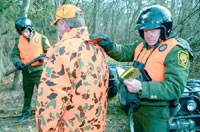
 The Pennsylvania Civil Service Act, or the Commonwealth's Collective Bargaining Act, does not cover deputies. Deputies do not receive regular salary or wages, however, they may receive limited compensation for certain duties. History clearly has shown that, in the performance of their duties, deputies spend far more money than they make.
The Pennsylvania Civil Service Act, or the Commonwealth's Collective Bargaining Act, does not cover deputies. Deputies do not receive regular salary or wages, however, they may receive limited compensation for certain duties. History clearly has shown that, in the performance of their duties, deputies spend far more money than they make.
Deputy Wildlife Conservation Officers are recruited locally on an as needed basis. Applicants must be in good physical condition, have a good knowledge of hunting, trapping, and other outdoor activities, and be able to maintain a good working relationship with fellow officers and the public. Deputies use their personal vehicles while performing their duties.
DUTIES
Deputy Wildlife Conservation Officers should be prepared to function in all phases of the Game Commission's activity and assume the powers as authorized by the Game and Wildlife Code, subject to limitations as established by Commission Policy or Administrative Directives.
GENERAL LIMITATIONS
Persons who, by license or permit are authorized by the Commission to function in one of the following categories may not hold the position of Deputy Wildlife Conservation Officer:
- Hunting License Issuing Agent,
- Commercial Wildlife Pest Control Agent,
- Propagation Permittee,
- Menagerie Permittee,
- Fur Dealer, Rehabilitator,
- Regulated Hunting Grounds Operator,
- Taxidermist, or Exotic Wildlife Dealer.
BASIC REQUIREMENTS AND QUALIFICATIONS
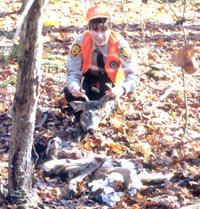
 Residence: Applicant must be a citizen of the United States and a resident of Pennsylvania. Applicant must have resided in the Commonwealth for at least 30 days prior to application. Persons appointed as Deputy Wildlife Conservation Officers shall be assigned to the district in which they reside. Minimum Education: High school graduate or GED equivalent certified by the Pennsylvania Department of Education. Must be knowledgeable of hunting and trapping practices. Age: Must be at least 21 years of age at the time of examination.
Residence: Applicant must be a citizen of the United States and a resident of Pennsylvania. Applicant must have resided in the Commonwealth for at least 30 days prior to application. Persons appointed as Deputy Wildlife Conservation Officers shall be assigned to the district in which they reside. Minimum Education: High school graduate or GED equivalent certified by the Pennsylvania Department of Education. Must be knowledgeable of hunting and trapping practices. Age: Must be at least 21 years of age at the time of examination.
Physical Requirements: Appointment to the position of Deputy Wildlife Conservation Officer is conditional upon passing medical, hearing, physical, strength and agility tests. Applicant must be able to read at least 20/70 with the better eye and 20/200 with the poorer eye WITHOUT corrective lenses, and at least 20/20 with the better eye and 20/40 with the poorer eye WITH corrective lenses. Failure to meet established fitness standards shall disqualify individuals for selection as a Deputy Wildlife Conservation Officer. Physical examination report forms will be provided, but doctor's fees shall be at the expense of the applicant.
Prior to taking the written entrance examination, each applicant will be required to successfully perform a physical test comprised of three exercises that will demonstrate that the applicant possesses the strength, agility and coordination to perform certain job related tasks.
1) The applicant must drag a 120 lb. dummy 50 feet and lift it onto a bumper rack on a vehicle within 20 seconds.
2) The applicant must scale a 6 foot wall without assistance in 12 seconds.
3) The applicant must cycle and dry fire an issued Glock pistol a minimum of 12 times in 15 seconds with both the strong and weak hand.
SPECIAL REQUIREMENTS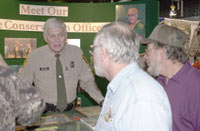
- Possess a valid Pennsylvania driver's license
- Accrue 20 hours of ride-along time with a Wildlife Conservation Officer prior to entrance exam
- Attain a minimum score of 70% on a written entrance examination administered by the Game Commission
- Attain a minimum score of 80% on a certification exam, after completing training school and an extension course
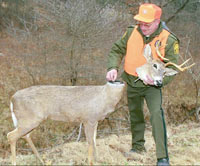
 A character investigation will be conducted on all applicants by the officer in charge of the district where the applicant resides. The investigation results, along with the application, shall be submitted on supplied forms. Any person who has had his/her hunting or furtaking privileges revoked may not apply until two years after revocation has ended. Anyone convicted of a summary violation (except minor traffic violations) within the prior year, or of a misdemeanor within the prior three years, or a felony at anytime, shall not be considered for appointment. Persons with a misdemeanor arrest or conviction in their background will be considered by a board of review on a case-by-case basis.
A character investigation will be conducted on all applicants by the officer in charge of the district where the applicant resides. The investigation results, along with the application, shall be submitted on supplied forms. Any person who has had his/her hunting or furtaking privileges revoked may not apply until two years after revocation has ended. Anyone convicted of a summary violation (except minor traffic violations) within the prior year, or of a misdemeanor within the prior three years, or a felony at anytime, shall not be considered for appointment. Persons with a misdemeanor arrest or conviction in their background will be considered by a board of review on a case-by-case basis.
TRAINING
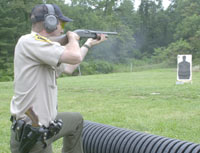
 All applicants who successfully complete the written examination shall complete a basic training/orientation program prior to appointment. Basic training is conducted at the Game Commission's Ross Leffler School of Conservation in Harrisburg, and involves approximately 75 hours of training over the course of a week. After completing the basic training and being appointed to the position of Deputy Wildlife Conservation Officer, Deputies must accrue 80 hours of on-the-job training with the Wildlife Conservation Officer during the probationary year. From that point on, all Deputies are required to attend the following in-service training sessions annually:
All applicants who successfully complete the written examination shall complete a basic training/orientation program prior to appointment. Basic training is conducted at the Game Commission's Ross Leffler School of Conservation in Harrisburg, and involves approximately 75 hours of training over the course of a week. After completing the basic training and being appointed to the position of Deputy Wildlife Conservation Officer, Deputies must accrue 80 hours of on-the-job training with the Wildlife Conservation Officer during the probationary year. From that point on, all Deputies are required to attend the following in-service training sessions annually:
- At least four district training sessions
- Two firearm qualification shoots
- Eight hours of defensive tactics training
- Legal updates training
- Verbal communication skills training
District training sessions cover such topics as Law Enforcement Methods and Techniques; Wildlife Law and Regulations; Principles of Wildlife Management; Land Management Practices; Conservation Education; Public Relations; Hazardous Materials/Employee Right-To-Know.
Click here for more information.
THE PENNSYLVANIA GAME COMMISSION IS AN EQUAL OPPORTUNITY EMPLOYER